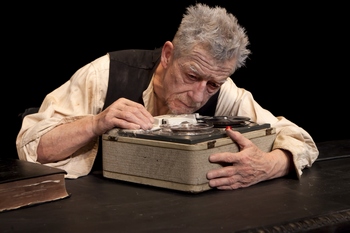SITE GUIDE
SEARCH
REVIEWS
REVIEW ARCHIVES
ADVERTISING AT CURTAINUP
FEATURES
NEWS
Etcetera and
Short Term Listings
LISTINGS
Broadway
Off-Broadway
NYC Restaurants
BOOKS and CDs
OTHER PLACES
Berkshires
London
California
New Jersey
DC
Connecticut
Philadelphia
Elsewhere
QUOTES
TKTS
PLAYWRIGHTS' ALBUMS
LETTERS TO EDITOR
FILM
LINKS
MISCELLANEOUS
Free Updates
Masthead
A CurtainUp Review
Krapp's Last Tape
By Les Gutman
|
Nothing to say, not a squeak. What's a year now? The sour cud and the iron stool. (Pause.) Revelled in the word spool. (With relish.) Spooool! Happiest moment of the past half million. (Pause.)
—Krapp |

John Hurt (Photo: Richard Termine)
|
Beckett was fifty-one years old when he wrote Krapp's Last Tape. That's a time when some people think they ought to reflect on their lives, whereas others are inclined to project into the future, perhaps starting to stare at their own mortality. Beckett was also nearly halfway between the two principal versions of Krapp he presents to us -- the thirty-nine year old we hear on tape, and the sixty-nine year old who is before us on stage. It's an interesting continuum: the younger man thinks he's at "the crest of the wave"; the older has nothing left to say. And the playwright wrestles with both.
Is this what Beckett had on his mind? Your guess is as good as mine. He throws enough ideas our way to easily fill a well-rounded education. Which are his themes, I confess I don't know. For his part, certainly, Beckett always eschewed such digging. (On who Godot was, he famously said, "If I knew, I would have said so in the play". And then there's that pronouncement in Watt, "No symbols where none intended." But he gives us plenty to chew on.
A good two or three minutes of the brief play are devoted to the banana, probably as many to the pleasure one can apparently gain from pronouncing the word "spool," and even more to the meaning of the word "viduity." (Krapp seemed to know at thirty, but had forgotten thirty years later.) But what's more compelling is the way he treats the darker half of more abstract notions. His meticulous stage directions create a black void outside of the square of light cast from the lone light bulb above Krapp's lone table with its lone chair. There, Krapp speaks repeatedly of aloneness: "With all this darkness around me," Krapp says, "I feel less alone." Most of all, perhaps, there is the silence. A dozen minutes of it before Krapp says his first audible word, and many long pauses to follow. His younger self reports on silence too, and Krapp feels compelled to listen to one of these sections again and again: "Past midnight. Never knew such silence. The earth might be uninhabited." After the tape has its last word, we are left with Beckett's final stage direction: "The tape runs on in silence."
Krapp is a juicy role for actors of a certain age, and many of them have given it a stab. John Hurt is now taking his second. (He portrayed Krapp a decade ago, and that performance is floating around on DVD for anyone inclined to see it. Interestingly, the taped Krapp in the show now is that recorded originally by Hurt for the 2001 performance.) Under Michael Colgan's quite faithful direction, Hurt seems to be embodying the essence of Krapp as Beckett's (oft-revised) script intended; indeed, his looks almost make him seem to be Beckett himself. It's a judiciously calibrated performance, both physically and vocally. with plenty of clowning, but not more than called for. There is regret, anger, good ol' crankiness, but none is permitted to overtake the character. Krapp also likes his drink, but Hurt resists making too much of it. Despite its economy of words, this is a play where nothing should intrude too much into what Beckett says.
For all its focus on those opposites of light and dark, in the end Krapp's Last Tape leaves us with many shades of gray. And those very yellow banana peels.
|
Krapp's Last Tape by Samuel Beckett Directed by Michael Colgan starring John Hurt Lighting by James McConnell A production of the Gate Theatre (Dublin) Running Time: 55 minutes with no intermission BAM Harvey Theater, 651 Fulton Street (Ashland/Rockwell Pl.), Brooklyn (718) 636-4100; www.bam.org Dec. 8—11, 13—17 @7:30, Dec. 10, 14, 17 @2, Dec. 11, 18 @ 3 Reviewed by Les Gutman based on 12/6/11 performance |
|
REVIEW FEEDBACK Highlight one of the responses below and click "copy" or"CTRL+C"
Paste the highlighted text into the subject line (CTRL+ V): Feel free to add detailed comments in the body of the email. . .also the names and emails of any friends to whom you'd like us to forward a copy of this review. Visit Curtainup's Blog Annex For a feed to reviews and features as they are posted add http://curtainupnewlinks.blogspot.com to your reader Curtainup at Facebook . . . Curtainup at Twitter Subscribe to our FREE email updates: E-mail: esommer@curtainup.comesommer@curtainup.com put SUBSCRIBE CURTAINUP EMAIL UPDATE in the subject line and your full name and email address in the body of the message. If you can spare a minute, tell us how you came to CurtainUp and from what part of the country. |

Slings & Arrows-the complete set
You don't have to be a Shakespeare aficionado to love all 21 episodes of this hilarious and moving Canadian TV series about a fictional Shakespeare Company
width="100" border=0>
South Pacific

In the Heights

